On Saturday afternoon, tens of thousands of protestors peacefully marched through central Seoul under police protection in the second massive rally held in three weeks against government policies, defying concerns over violent confrontation between demonstrators and the police.
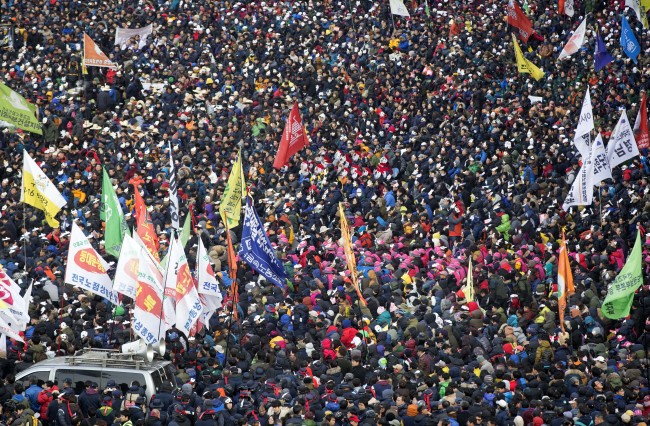 |
| Thousands of protesters, many wearing masks, hold a rally Saturday at Seoul Plaza in downtown Seoul opposing the government’s reinstatement of state history textbooks and labor reform measures. Police estimated 14,000 people gathered for the rally that ended without any clashes. (Yonhap) |
An estimated crowd of 14,000 people flocked to Seoul Plaza, a square outside City Hall, in the afternoon to demand President Park Geun-hye step down, condemning her administration for stifling political freedom and pushing ahead with controversial education, trade and labor policies. The protest organizers put the number of participants at 50,000.
Many of the participants turned up wearing playful masks including Guy Fawkes, Transformers and Sailor Moon, in an apparent attempt to lampoon President Park’s recent comments likening mask-wearing protestors to Islamic State terrorists. She earlier called for a ban on wearing face coverings during protests.
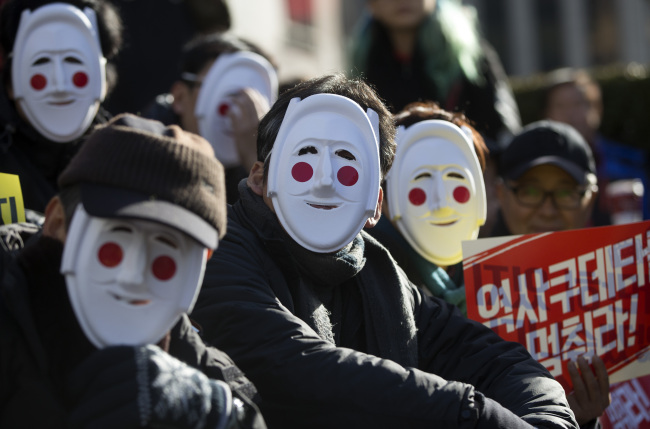 |
| (Yonhap) |
Saturday’s antigovernment protest was held in a peaceful manner without major clashes between the police and protestors, with no reports of injuries or police arrests. It was smaller in scale than the Nov. 14 rally that drew about 70,000 people to the same venue.
The first mass rally, the largest in more than seven years, spiraled into violence as the police fired water cannons mixed with tear gas to stop protestors trying to march to the presidential office. The rally left hundreds of police officers and protestors injured.
Baek Nam-ki, a 69-year-old farmer, remained unconscious as of Sunday after being knocked down by the water cannon blast from the police during the protest. His collapse triggered a public backlash over “excessive use of force,” while the police pinned blame on “violent” protestors.
The rally kicked off at around 3 p.m. with more than 100 civic, labor, students and famers’ group members packing the huge square, waving flags and holding placards that read, “Park Geun-hye, step down,” “Stop the labor market reform” and “Opposition to state-issued history textbooks.”
“Things that took place 30 years ago under the authoritarian regime are happening now. The government is trying to hide the public backlash they are facing by relying on police force,” said Han Sang-kyun, a head of Korea Confederation of Trade Unions, through a video opening message.
Han has taken sanctuary in a Buddhist temple in Seoul to avoid being arrested on charges of leading what the police called illegal rallies in May. In the message, he announced the KCTU’s plan to stage an all-out strike on Dec. 16.
The protest came amid mounting tensions as the police vowed heavy-handed measures against “violent” protestors and banned the scheduled second rally, citing possible violence that could break out during the protest.
In response, the rally organizers ― KCTU, Korean Peasants League and Association of Civic Groups ― lambasted the government for cracking down on freedom of expression and slipping back into past authoritarian rule.
The Seoul Administrative court on Thursday invalidated the police ban, paving the way for the second massive protest in central Seoul. Following the ruling, the rally organizers pledged to keep the protest peaceful.
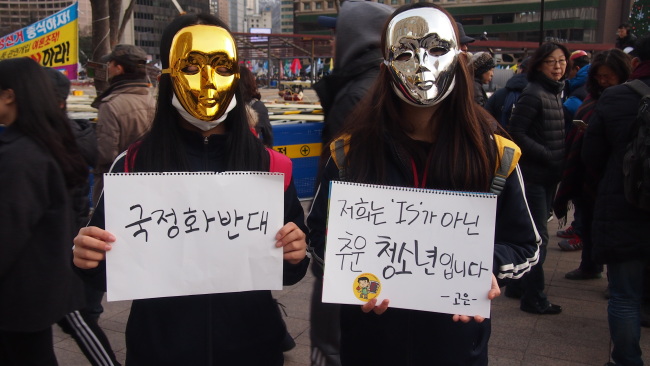 |
| (Ock Hyun-ju/The Korea Herald) |
On the sidelines of the demonstration, a group of students were sighted holding a placard reading “I am not Islamic State terrorist, but only a student feeling cold,” while donning masks.
“I came here today wearing a mask to criticize President Park for comparing her citizen to a terrorist and to oppose the government trying to adopt a state-authored history textbook,” Eum Go-eun, a 17-year-old student, told The Korea Herald.
“The government never listens to its people. This is not the democracy I learned through books. There seems to be neither cooperation nor compromise in the adults’ world,” she said. “I hope the society becomes a better place to live in for us and our next generation.”
During the interview with Eum and her friends standing next to City Hall building shivering in the cold, they were disrupted and scolded several times by the elderly.
“What the hell are you doing? What do you know, you children?” one elderly person said, which eventually led the students to break up and move to another place.
Ahead of the rally, some 30 main opposition lawmakers from New Politics Alliance for Democracy including its leader Moon Jae-in as well as 500 religious leaders including Buddhist monks, Protestants and Catholics joined the fray, echoing hope for a peaceful demonstration.
 |
| (Ock Hyun-ju/The Korea Herald) |
“In the society witnessing democracy’s collapse, we (religious leaders) will open the path of flowers. Peace doesn’t mean that nothing happens. Peace comes when justice bears fruits,” a pastor said.
On the opposite side of the road, some 3,700 right-wing protestors, mostly in their 60s to 80s wearing military uniforms, staged a counter rally to take a swipe at the left-wing demonstrators. Labeling the recent rallies as violent and illegal, they urged the government to sternly punish masked protestors who refuse the rule of law and seek to overthrow the administration.
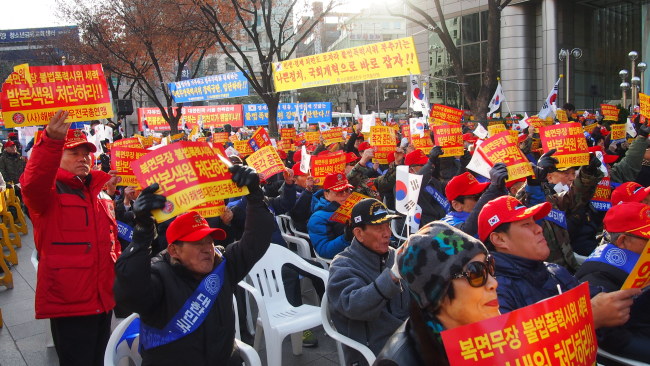 |
| (Ock Hyun-ju/The Korea Herald) |
As dusk gathered at 5 p.m., the protestors began to march about 3.5 km toward Seoul National University Hospital where Baek lay in a coma.
About 20,000 police officers were mobilized to maintain order, but they did not set up bus barricades and water cannons this time. Instead, the police led the protestors into the right side of the road and protected them from the traffic to help them march forward peacefully.
The protestors, meanwhile, did not bring metal pipes or ropes that the police viewed as illegal demonstration tools to the rally scene, marched forward in an orderly manner and ended the event in time.
“The protest today was really peaceful unlike the first rally. The government did not shut down the place for free speech,” a monk Jinhwa, who traveled from Cheongju to oversee any human rights abuse cases during the rally, told The Korea Herald.
“This is how the rallies should be in the future. The police should protect people’s rights for free speech and citizens should peacefully express their opinions within the legal framework just like today,” he said.
“The peaceful rallies will not bring changes quickly, but this is the step we should take until our voices are heard.”
With loudspeakers blaring, the demonstrators walked along the road and chanting the slogans “President Park, Out” or “No to state-authored history books.”
 |
| (Patrick Murray) |
Among the crowd was Kim Yong-do, who brought his wife and 3-year-old baby in a pram to the demonstration.
“I came here as I was angry that the government earlier tried to ban rallies,” Kim, told The Korea Herald, wearing a mask and walking along with fellow demonstrators. “The government should not ban rallies as they are the only ways to have our voices heard in this society.”
“So far, violence prompted further violence during protests. But today’s rally has been so peaceful. Now I am more than certain that I can bring my kids and parents here to voice our opinions.”
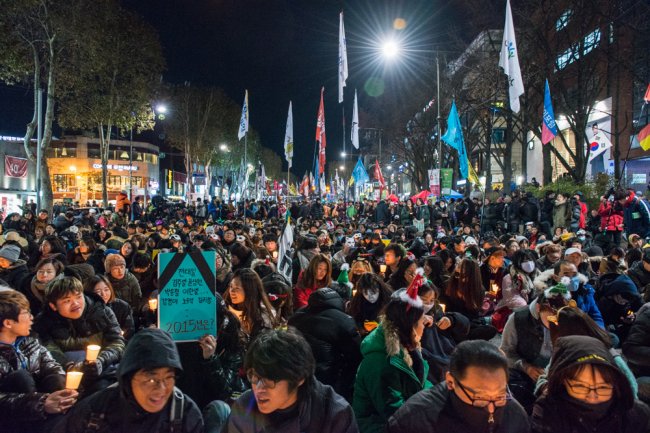 |
| (Patrick Murray) |
As the demonstrators arrived in front of the hospital, the atmosphere quickly turned lively amid cheers. When two women took to the stage to perform a play and rock song satirizing President Park, spectators laughed, clapped and danced to the music.
The demonstration ended at around 8:30 p.m. as planned after the farmer Baek’s daughters shed tears expressing gratitude to the unexpectedly large crowd who walked to the hospital despite the biting cold.
“I hope my father hears you and gains consciousness right now. Please, stay with us until my father wakes up and thank you for praying for us,” said Baek Mi-joo-hwa, his younger daughter.
By Ock Hyun-ju (laeticia.ock@heraldcorp.com)

